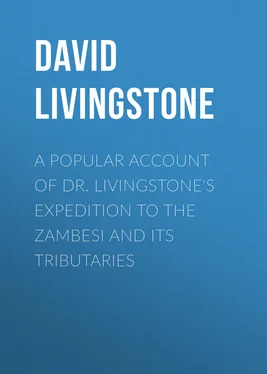David Livingstone - A Popular Account of Dr. Livingstone's Expedition to the Zambesi and Its Tributaries
Здесь есть возможность читать онлайн «David Livingstone - A Popular Account of Dr. Livingstone's Expedition to the Zambesi and Its Tributaries» — ознакомительный отрывок электронной книги совершенно бесплатно, а после прочтения отрывка купить полную версию. В некоторых случаях можно слушать аудио, скачать через торрент в формате fb2 и присутствует краткое содержание. Издательство: Иностранный паблик, Жанр: Путешествия и география, foreign_antique, foreign_prose, на английском языке. Описание произведения, (предисловие) а так же отзывы посетителей доступны на портале библиотеки ЛибКат.
- Название:A Popular Account of Dr. Livingstone's Expedition to the Zambesi and Its Tributaries
- Автор:
- Издательство:Иностранный паблик
- Жанр:
- Год:неизвестен
- ISBN:нет данных
- Рейтинг книги:4 / 5. Голосов: 1
-
Избранное:Добавить в избранное
- Отзывы:
-
Ваша оценка:
- 80
- 1
- 2
- 3
- 4
- 5
A Popular Account of Dr. Livingstone's Expedition to the Zambesi and Its Tributaries: краткое содержание, описание и аннотация
Предлагаем к чтению аннотацию, описание, краткое содержание или предисловие (зависит от того, что написал сам автор книги «A Popular Account of Dr. Livingstone's Expedition to the Zambesi and Its Tributaries»). Если вы не нашли необходимую информацию о книге — напишите в комментариях, мы постараемся отыскать её.
A Popular Account of Dr. Livingstone's Expedition to the Zambesi and Its Tributaries — читать онлайн ознакомительный отрывок
Ниже представлен текст книги, разбитый по страницам. Система сохранения места последней прочитанной страницы, позволяет с удобством читать онлайн бесплатно книгу «A Popular Account of Dr. Livingstone's Expedition to the Zambesi and Its Tributaries», без необходимости каждый раз заново искать на чём Вы остановились. Поставьте закладку, и сможете в любой момент перейти на страницу, на которой закончили чтение.
Интервал:
Закладка:
The main object of this Zambesi Expedition, as our instructions from Her Majesty’s Government explicitly stated, was to extend the knowledge already attained of the geography and mineral and agricultural resources of Eastern and Central Africa—to improve our acquaintance with the inhabitants, and to endeavour to engage them to apply themselves to industrial pursuits and to the cultivation of their lands, with a view to the production of raw material to be exported to England in return for British manufactures; and it was hoped that, by encouraging the natives to occupy themselves in the development of the resources of the country, a considerable advance might be made towards the extinction of the slave-trade, as they would not be long in discovering that the former would eventually be a more certain source of profit than the latter. The Expedition was sent in accordance with the settled policy of the English Government; and the Earl of Clarendon, being then at the head of the Foreign Office, the Mission was organized under his immediate care. When a change of Government ensued, we experienced the same generous countenance and sympathy from the Earl of Malmesbury, as we had previously received from Lord Clarendon; and, on the accession of Earl Russell to the high office he has so long filled, we were always favoured with equally ready attention and the same prompt assistance. Thus the conviction was produced that our work embodied the principles, not of any one party, but of the hearts of the statesmen and of the people of England generally. The Expedition owes great obligations to the Lords of the Admiralty for their unvarying readiness to render us every assistance in their power; and to the warm-hearted and ever-obliging hydrographer to the Admiralty, the late Admiral Washington, as a subordinate, but most effective agent, our heartfelt gratitude is also due; and we must ever thankfully acknowledge that our efficiency was mainly due to the kind services of Admirals Sir Frederick Grey, Sir Baldwin Walker, and all the naval officers serving under them on the East Coast. Nor must I omit to record our obligations to Mr. Skead, R.N. The Luawé was carefully sounded and surveyed by this officer, whose skilful and zealous labours, both on that river, and afterwards on the Lower Zambesi, were deserving of all praise.
In speaking of what has been done by the Expedition, it should always be understood that Dr. Kirk, Mr. Charles Livingstone, Mr. R. Thornton, and others composed it. In using the plural number they are meant, and I wish to bear testimony to the untiring zeal, energy, courage, and perseverance with which my companions laboured; undaunted by difficulties, dangers, or hard fare. It is my firm belief that, were their services required in any other capacity, they might be implicitly relied on to perform their duty like men. The reason why Dr. Kirk’s name does not appear on the title-page of this narrative is, because it is hoped that he may give an account of the botany and natural history of the Expedition in a separate work from his own pen. He collected above four thousand species of plants, specimens of most of the valuable woods, of the different native manufactures, of the articles of food, and of the different kinds of cotton from every spot we visited, and a great variety of birds and insects; besides making meteorological observations, and affording, as our instructions required, medical assistance to the natives in every case where he could be of any use.
Charles Livingstone was also fully occupied in his duties in following out the general objects of our mission, in encouraging the culture of cotton, in making many magnetic and meteorological observations, in photographing so long as the materials would serve, and in collecting a large number of birds, insects, and other objects of interest. The collections, being Government property, have been forwarded to the British Museum, and to the Royal Botanic, Gardens at Kew; and should Dr. Kirk undertake their description, three or four years will be required for the purpose.
Though collections were made, it was always distinctly understood that, however desirable these and our explorations might be, “Her Majesty’s Government attached more importance to the moral influence that might be exerted on the minds of the natives by a well-regulated and orderly household of Europeans setting an example of consistent moral conduct to all who might witness it; treating the people with kindness, and relieving their wants, teaching them to make experiments in agriculture, explaining to them the more simple arts, imparting to them religious instruction as far as they are capable of receiving it, and inculcating peace and good will to each other.”
It would be tiresome to enumerate in detail all the little acts which were performed by us while following out our instructions. As a rule, whenever the steamer stopped to take in wood, or for any other purpose, Dr. Kirk and Charles Livingstone went ashore to their duties: one of our party, who it was intended should navigate the vessel and lay down the geographical positions, having failed to answer the expectations formed of him, these duties fell chiefly to my share. They involved a considerable amount of night work, in which I was always cheerfully aided by my companions, and the results were regularly communicated to our warm and ever-ready friend, Sir Thomas Maclear of the Royal Observatory, Cape of Good Hope. While this work was going through the press, we were favoured with the longitudes of several stations determined from observed occultations of stars by the moon, and from eclipses and reappearances of Jupiter’s satellites, by Mr. Mann, the able Assistant to the Cape Astronomer Royal; the lunars are still in the hands of Mr. G. W. H. Maclear of the same Observatory. In addition to these, the altitudes, variations of the compass, latitudes and longitudes, as calculated on the spot, appear in the map by Mr. Arrowsmith, and it is hoped may not differ much from the results of the same data in abler bands. The office of “skipper,” which, rather than let the Expedition come to a stand, I undertook, required no great ability in one “not too old to learn:” it saved a salary, and, what was much more valuable than gold, saved the Expedition from the drawback of any one thinking that he was indispensable to its further progress. The office required attention to the vessel both at rest and in motion. It also involved considerable exposure to the sun; and to my regret kept me from much anticipated intercourse with the natives, and the formation of full vocabularies of their dialects.
Читать дальшеИнтервал:
Закладка:
Похожие книги на «A Popular Account of Dr. Livingstone's Expedition to the Zambesi and Its Tributaries»
Представляем Вашему вниманию похожие книги на «A Popular Account of Dr. Livingstone's Expedition to the Zambesi and Its Tributaries» списком для выбора. Мы отобрали схожую по названию и смыслу литературу в надежде предоставить читателям больше вариантов отыскать новые, интересные, ещё непрочитанные произведения.
Обсуждение, отзывы о книге «A Popular Account of Dr. Livingstone's Expedition to the Zambesi and Its Tributaries» и просто собственные мнения читателей. Оставьте ваши комментарии, напишите, что Вы думаете о произведении, его смысле или главных героях. Укажите что конкретно понравилось, а что нет, и почему Вы так считаете.












![Edward Ellis - Adrift on the Pacific - A Boys [sic] Story of the Sea and its Perils](/books/753342/edward-ellis-adrift-on-the-pacific-a-boys-sic-s-thumb.webp)